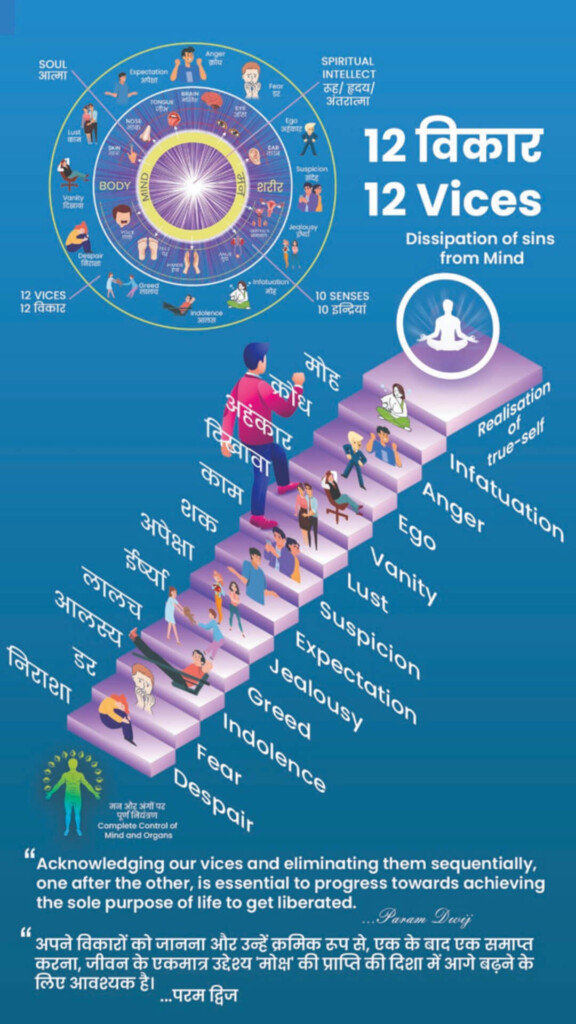
My dear Dwij, when we speak of vices, we speak of shadows that cling to the soul—those flawed actions and negative patterns that hinder the purity of your existence. These vices do not merely cloud your thoughts; they also obscure your path to spiritual enlightenment, binding you to the endless cycle of suffering and ignorance. They are obstacles that distance you from your true nature and from Daata, the Supreme Consciousness that resides within and around you. Throughout history, sages and philosophers have warned against these vices, for they are the roots of spiritual stagnation and ethical decay. But today, I wish to guide you toward understanding them—not with fear, but with awareness. There are twelve such vices that a true seeker, a Dwij, must transcend to realize the fullness of self in this lifetime. These vices are deeply interconnected, feeding into one another like threads in a web, making it essential to recognize and unravel them with courage and patience.
Overcoming these vices is indeed a challenging journey, for they are persistent and subtle, often disguising themselves as harmless desires or fleeting thoughts. Yet, I tell you this: within every challenge lies the seed of transformation. Understanding these twelve vices and consciously working to transcend them will unlock the virtues that lead to liberation and spiritual enlightenment. This journey of confronting your flaws is not a sign of weakness, my dear dwij—it is a testament to the strength of your spirit and its capacity for growth. The transformation that comes from overcoming these vices is not just a possibility, but a promise.

Each vice carries a lesson, a hidden insight into the workings of your inner world. When you address these vices with honesty and pure intention, you will find yourself walking on the righteous path of spiritual evolution. The road may be difficult, but it is also profoundly rewarding, for it leads to the ultimate truth of existence—a life aligned with the Supreme Consciousness, Daata. Remember, this is your journey, and you hold the power to shape your spiritual growth. In the following sections, I will illuminate these twelve vices for you, one by one. Together, we will explore their nature, their effects on your mind and soul, and the practical steps to overcome them. Remember, these vices are not your enemies; they are your teachers, here to guide you toward self-realization. So, I ask you, my dear Dwij: are you ready to walk this path? To face the shadows within and embrace the light of truth? Let us begin this journey together, for the time to awaken spiritually is now.
1. Despair (निराशा)
My dear dwij, we will go from the easiest vice to tackle to the most difficult one. The first one is despair. It feels like carrying a mountain on your chest, doesn’t it? You lose hope, and suddenly, everything feels meaningless. You question your worth and your place in the world. But you know what? Despair is a clever illusion. It tricks you into believing it’s permanent when, really, it’s just a phase—a long night before dawn. Let me tell you this: despair only grows if you feed it. Stop watering it with your tears. You’re stronger than you feel right now, and you have the strength within you to overcome it.
Here’s how to move past it:
- Start small. Just sit quietly and breathe. Be here, at this moment, not in the chaos of your thoughts.
- Look for the little joys—a good meal, a smile, the sun’s warmth. Tiny things add up.
- Read or listen to teachings that remind you of life’s bigger purpose. Perspective is powerful.
- Every setback is a lesson in disguise. What is this moment teaching you?
- Surround yourself with people who bring light. And if you can’t find any, be that light for yourself.
- Do something creative—paint, write, cook. Channel your feelings into action.
- Remember when you thought you wouldn’t make it, yet here you are. If you could survive that, you can survive this too.
2. Fear (डर)
Having addressed and dispensed with despair, we can now focus on a truly pervasive emotion: fear. Fear can be incredibly insidious; it creeps into our thoughts and conversations, often uninvited. It has a way of whispering all the ominous “what ifs” into our ears, creating a hesitance that keeps us anchored in place. Questions like, “What if I fail?”, “What if I’m not good enough?” or “What if I embarrass myself?” begin to swarm our minds, making it easy to become trapped in a cycle of doubt.
While it’s entirely normal to experience fear—it is a fundamental human emotion—allowing it to dominate your life can prevent you from engaging fully with your experiences and dreams. Living in the grip of fear can stifle your potential, pushing you to the sidelines where you might miss out on wonderful opportunities or personal growth. However, it’s crucial to understand that fear is not an enemy to be vanquished. Instead, it’s a part of your inner world that seeks acknowledgement and reassurance. Instead of fleeing from this uncomfortable feeling, consider embracing it. Acknowledge fear’s presence with a simple yet profound statement: “I see you, fear, but despite your whispers, I choose to move forward anyway.” This approach allows you to confront fear with compassion rather than hostility, ultimately empowering you to take steps toward your aspirations, regardless of the uncertainty accompanying them.
Here’s what to try:
- Turn fear into faith. Say a prayer to Daata, repeat affirmations or trust that the universe has your back.
- Take one small step toward what scares you. Just one. Courage grows with practice.
- Believe that nothing lasts forever—not even tough times. Trust in the flow of life.
- Sit with your fears. Journal about them or meditate on them. The more you understand them, the smaller they’ll feel.
- Take deep, steady breaths when fear grips you. It’s amazing how calming your breath can calm your mind.
- Picture yourself succeeding instead of failing. Visualize the best outcome.
- Talk to someone—a mentor, a friend, or a guide. Sometimes, we need a little light from others to find our way.
3. Indolence (आलस्य)
We move on to Idolence after eliminating the two vices. Ah, laziness. It’s tempting, isn’t it? Just stay in your comfort zone and say, “I’ll do it tomorrow.” But here’s the thing—indolence isn’t just about doing nothing; it’s about missing out on who you could become. It robs you of growth, joy, and the satisfaction of effort. Rest is important, but don’t let rest turn into avoidance. Life’s gifts are waiting for you, but you’ve got to show up to receive them.
What can help:
- Set small, doable goals. Start with something simple, like making your bed.
- Get moving—go for a walk, do yoga, dance. Movement energizes the mind.
- Think about what’s at stake if you don’t act. What opportunities are you missing?
- Share your goals with someone who can hold you accountable.
- Break big tasks into small steps. A mountain is climbed one stone at a time.
- Celebrate even the tiniest victories. Progress is still progress, no matter how small.
- Close your eyes and imagine the life you want. Then ask yourself, “What’s one thing I can do today to move closer to that?”
4. Greed (लालच)
Now that we have eliminated three vices, we moved to the fourth, greed. Greed is tricky, isn’t it? It whispers, “Just a little more, and then you’ll be happy.” But let me tell you something—it’s a lie. Greed is never satisfied. No matter how much you have, it always says, “Not enough.” True richness isn’t in what you own—it’s in how much peace and joy you feel. And trust me, peace doesn’t come from accumulating; it comes from appreciating.
Here’s what to try:
- Pause and take a good look at your life. What do you already have? Be grateful for it.
- Give, even if it’s something small. Sharing creates a kind of wealth that greed can never give you.
- Reflect on how temporary material things are. What truly matters in the end?
- Practice gratitude daily. Write down three things you’re thankful for, no matter how small.
- Ask yourself, “Why do I want this? Will it bring me lasting happiness?”
- Simplify your life. Let go of what you don’t need and focus on what matters.
- Spend time in nature. The world has so much abundance—you have to look for it.
5. Jealousy (ईर्ष्या)
It will get trickier as we move on to the fifth vice, jealousy. Jealousy—it’s like a thief that steals your peace. “Why them and not me?” it asks. It makes you resentful and restless as if someone else’s success takes something away from you. But here’s the truth: someone else’s light doesn’t dim yours. There’s enough for everyone. Celebrate others’ wins, and you’ll find that life starts celebrating you, too.
What can help:
- When someone succeeds, say to yourself, “Good for them! My time will come.”
- Focus on your journey. Everyone’s path is unique, and comparison is a trap.
- Trust that the universe has plenty to give. There’s no shortage of joy or success.
- Be kind to yourself. Jealousy often comes from feeling “not enough.” But you are enough.
- Look inward. What’s triggering your jealousy? What can you learn from it?
- Practice empathy. Remember, everyone has struggles—even those who seem to have it all.
- Build relationships that emphasize collaboration over competition. When you grow together, jealousy fades.
6. Expectation (अपेक्षा)
We have eliminated five vices and moved on to the sixth Expectation. Ah, expectations. They’re like invisible strings we tie to people and situations. “I thought you’d do this.” “I expected it to be like that.” And when those strings snap, they hurt. Here’s the thing: expectations often set you up for disappointment. Life doesn’t always go as planned, and people don’t always behave how you want. But when you let go of those strings, you feel lighter, freer.
Here’s what to practice:
- Focus on the effort, not the outcome. Do your best and let life handle the rest.
- Replace expectations with trust. Trust that things are unfolding exactly as they should.
- Love without conditions. When you give without expecting, you’ll feel a deeper joy.
- Reflect on how temporary everything is. Why hold on so tightly?
- Be grateful for what is instead of longing for what could be.
- Communicate openly. Clear expectations can prevent misunderstandings.
- Stay present. The future is uncertain, but the present is a gift.
Dear seeker, remember these emotions and habits don’t define you. They are just passing storms on your journey. Each one holds a lesson, and each lesson brings you closer to your highest self. You’re walking a divine path, even when it doesn’t feel like it. Trust it, and trust yourself. We are still halfway there, but we are moving forward to more difficult ones.
7. Suspicion (शक)
Ah, suspicion—such a quiet, destructive force. It starts with a tiny seed of doubt, doesn’t it? A glance, a word, or a moment that doesn’t sit right. And then, before you know it, it spirals, growing roots deep into your mind. Suddenly, you’re questioning everything: motives, honesty, intentions. But here’s the truth, my dear: suspicion often says more about us than it does about others. It’s born from our insecurities, fears, and past wounds. And while it may seem like suspicion protects us, it actually isolates us, creating walls where bridges should be.
How to ease the grip of suspicion:
- Talk openly. Share your concerns with honesty and kindness. Most misunderstandings dissolve in the light of conversation.
- Work on your own self-confidence. A strong sense of self leaves less room for doubt.
- Trust your intuition, but don’t let it turn into paranoia. Balance it with empathy and logic.
- Learn to be vulnerable. Trust requires courage, and it grows stronger when nurtured.
- Seek advice from someone you trust—an outsider’s perspective can often clear the fog.
- Reflect on moments when trust transformed your relationships and brought you closer to others.
Suspicion can dim the light of even the strongest relationships. But with trust and understanding, that light can shine again.
8. Lust (काम)
After eliminating several vices, we move to the eighth, lust. Lust—it’s one of those words that carries so much weight, doesn’t it? It’s a desire so consuming that it often pulls us away from our higher selves. You might think it’s just about physical cravings, but it’s deeper than that. Lust is a distraction, a powerful force that can reduce relationships to fleeting transactions rather than soulful connections. But here’s what I’ve learned: lust, when unchecked, is a hungry flame. It burns brightly but doesn’t last. It leaves a sense of emptiness—a realization that life’s deeper, meaningful joys can’t be found in fleeting pleasures.
To channel and transform this energy:
- Focus on creating something—art, music, even a heartfelt conversation. Creativity redirects desire into beauty.
- Meditate. Quiet your mind and reflect on what truly fulfils you beyond temporary satisfaction.
- Think about love not just as attraction but as understanding, respect, and companionship.
- Practice mindfulness. Desires lose their power when observed with awareness.
- Understand that physical pleasures are fleeting. True joy comes from meaningful connections.
Remember, the heart longs for connection, not just possession. Honouring this truth, we discover relationships that nourish us in every way.
9. Vanity (दिखावा)
Moving further to Ninth, Vanity. Vanity—it’s a subtle trap, isn’t it? It sneaks in when we’re chasing approval or admiring ourselves a little too much. And while there’s nothing wrong with celebrating your achievements or taking pride in your appearance, the problem arises when these become the measure of your worth. Think about it: does wearing the most expensive clothes or flaunting a title truly make you happy? Or does it leave you chasing more likes, applause, and validation? Vanity keeps us stuck on the surface, but life’s real treasures are always found deeper.
To find freedom from vanity:
- Start with gratitude. Recognize that everything you have—your talents, looks, success—is a gift, not just your doing.
- Do something selfless. Helping others reminds us that life isn’t all about us.
- Reflect on what truly defines you. Is it your appearance or your character? Your possessions or your kindness?
- Surround yourself with people who value authenticity over pretence.
- Remember: everything external—beauty, fame, wealth—is temporary. But who you are lasts forever.
True beauty, my dear Dwij, shines from within. It’s in how you treat others, how you live, and how you love.
10. Ego (अहंकार)
Moving to the tenth vice, ego. Ego—that tricky little voice inside us. It whispers, “You’re better than them,” or worse, “How dare they disrespect you?” And suddenly, we’re caught in a cycle of pride, hurt, and defensiveness. But let me tell you something I’ve learned: the ego isn’t your enemy. It’s just trying to protect you, to assert your worth. The problem is that it often overreacts, creating barriers where bridges are needed. When we let go of ego, we don’t lose ourselves—we rediscover our connection to others.
How to keep the ego in check:
- Reflect daily. Ask yourself, “Did my pride hurt someone today? Could I have handled things differently?”
- Practice humility. Remember, no one is above or beneath you—we’re all walking our own paths.
- Let go of the need to always be right. Sometimes, peace is more important than being correct.
- Serve others. Nothing dissolves ego faster than acts of kindness.
- Remind yourself of the bigger picture. Life isn’t a competition; it’s a journey of growth.
When you quiet the ego, you make space for understanding, compassion, and deeper relationships.
11. Anger (क्रोध)
After eliminating ten difficult vices, we move on to the difficult ones: anger. We’ve all felt that hot surge of anger when things don’t go our way. It’s so human, so normal. But anger, when left unchecked, becomes a fire that consumes everything—our peace, our relationships, and even our health. I’ve come to see anger as a messenger. It’s telling us something—maybe we feel disrespected or carrying pain we haven’t dealt with. The key is to listen without letting it take over.
Here’s how to handle anger gently:
- Pause. Take a deep breath, or ten. Give yourself space before reacting.
- Ask yourself, “What’s making me angry? Is it worth this energy?”
- Channel it into something positive—write, exercise, or create. Let it fuel growth, not destruction.
- Practice forgiveness. Holding onto anger only weighs you down.
- Reflect on the impermanence of anger. What seems huge now may not matter tomorrow.
Anger is like a storm—it passes. But the calmer you are, the less damage it leaves behind.
12. Infatuation (मोह)
The last and perhaps the most challenging of the vices we face in our emotional journeys is infatuation. Oh, infatuation—it’s truly a whirlwind of sensations, isn’t it? That exhilarating rush of emotion can leave us feeling on top of the world, filled with constant thoughts of the person who has captivated us, and those pesky butterflies fluttering wildly in our stomachs at every glance or smile they cast our way.
Yet, if we pause for a moment and take an honest look, we realize that this state can also be profoundly draining. When we find ourselves infatuated, our perception often becomes skewed; we start to lose touch with reality, filtering out anything that dampens our idealized vision. We become enveloped in a kind of dreamy haze that prevents us from seeing the person for who they truly are. We focus solely on what we desire and ignore the less appealing traits or situations. But here’s the crucial distinction: infatuation is not synonymous with love. Love is a deep, abiding connection that is characterized by steadiness, understanding, and patience. It grows and evolves over time, weathering storms and adapting to changes. Infatuation, in contrast, is much more transient. It’s akin to a firework display—bright, dazzling, and awe-inspiring while it lasts, but ultimately, it’s a fleeting experience. Once the spark fades, what remains is often a sense of longing or disillusionment, because the initial thrill was not built on a solid foundation.
To move beyond infatuation:
- Take a step back. Ask yourself, “Am I seeing the full picture or just the parts I want to see?”
- Focus on your goals and passions. Don’t let one person or idea consume your entire world.
- Practice mindfulness. Notice the difference between fleeting emotions and deeper truths.
- Seek guidance from someone you trust. Sometimes, an outside perspective can help you see clearly.
- Reflect on what you truly value in a relationship—companionship, growth, respect.
True connection comes not from obsession but from understanding. Let your heart be open but also wise.
Conclusion
Life has a way of throwing vices our way—things like anger, greed, and indulgence—that, over time, cloud our judgment. It’s almost as if these vices blur our connection to something greater, don’t you think? Deep down, we have this inner essence, a spiritual guide— “daata”—who is meant to lead us towards wisdom, compassion, and growth. But that connection starts to fade when we give in to our vices. We get further away from what’s pure and meaningful. Have you ever noticed how vices distort your reality? They promise temporary pleasure but in the end, they prevent you from truly seeing life with clarity. Your senses become distracted by these fleeting satisfactions rather than being in tune with the deeper things that bring peace. It’s like your mind gets overloaded, making it harder to tell what’s good for you and what’s not.
What’s even more interesting is that this doesn’t just affect our minds. It touches our souls, too. The soul is naturally aligned with truth, but it becomes heavy when we let these vices take over. It’s like a constant hunger that never really gets fed, no matter how much we try. The soul doesn’t want more distractions—it wants peace. It wants a return to its original, true state. We all face these obstacles in life, right? These vices keep us from walking the path of self-realization and spiritual growth. Every time we give into them—whether it’s anger, greed, or the need for external validation—we drift away from our true essence, from that divine wisdom inside us.
But here’s the good news. There’s a way out. It’s called self-discipline. It’s about making the choice to regulate your thoughts and actions consciously. Mindfulness is key. It helps you stay present and aware of what’s going on in your life and allows you to face those vices instead of being swept away by them. You start living in a way that aligns with your highest values. Through this kind of conscious living, you can begin to clear away the mental clutter. It’s like a cleansing that helps you regain clarity so you can see your true path. By nurturing your soul and reconnecting with the wisdom that’s already there, you start to walk a more fulfilled, enlightened life. It’s not an overnight change, but every small step counts.



